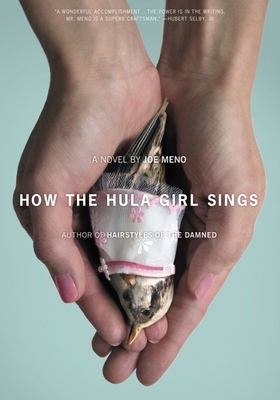
How the Hula Girl Sings is Joe Meno’s second novel, and it reads like an author who is beginning to get his legs about him in terms of style, tropes, and characters. There are flashes of what we see in later novels—experimentation with genre fiction, a blend of real and mystical imagery, and lovable characters who drive the action of the story.
This novel focuses on Luce Lemay and his return to the small town where, three years ago, he accidentally hit a baby carriage after robbing his boss in order to elope with a girl who had lied to him about being pregnant. It was the culmination of bad luck and bad decisions, tragic in any number of ways.
Meno uses Lemay’s story to begin an examination on problems like guilt and what individuals must do to come clean not only with themselves but with the people they hope to reintegrate with. While Luce reaches the point of making peace with himself, small-town Illinois never really does. Lemay concludes, “When it came down to it, it wasn’t about the things we had done, it wasn’t about the crimes we had laid with our own hands, it wasn’t even about us, it came down to what kind of men believed they had the right to lay judgment.”
Meno also tries to consider why some are lucky and some are tormented, especially in the novel’s final, poetic paragraph:
“There was no difference between a saint and a sinner in the skin, it all came from the sweet blood within. It all came from the tender truth hidden deep inside. The difference between the two was a think, wavering gentle line…Maybe it isn’t exactly clear how your heart beats, good or evil, dishonest or sweet, until it’s your time all alone in the dark, listening to the quiet whisper of your own lonely heart, the empty thump of your own fears shivering like an old kettle drum, bent and rusted and warped all wrong, or the distant murmur of all your hope, the lonely lullaby of a hula girl’s song.”
That gives a good sample of Meno’s phrasing and pacing, his ability to make something like Clutch’s (the gas station owner) tattoo into a larger symbol of hope.
The other images he works with in the book are arresting in the way that I tend to think of Southern literature and its violent tradition: the bird’s eyes that Junior tucked away in the wall, the birds in pink sweaters the hotel owner saves, the corn queen having snow cone debris raining down on her from an exploded machine, and then the man with no feet having his face burned on a gas stove. They are startling and each builds a character or characterizes the town and world that built a man like Luce. In the end, the town judges itself when it judges Luce, and maybe that’s why they show no mercy.
In terms of style, Meno is very concrete in this novel, the way rural writers tend to be as they re-create a hard world. But Meno blends his humor as well. After Lemay encounters Charlene’s fiancé, he says, “Losing that molar over a girl who wouldn’t even spare me a kiss made me feel like the imperial king of all fools.” Then later Meno is able to shift to a more metaphorical level without losing the immediacy he already established. In Lemay’s room is a picture of Mary. “The virgin’s breath revealed a hole in a dark-lit soul.” Or later still Meno gives us the line “Nothing had been there all along.” His short stories Demons in the Spring explore these boundaries more fully, but he’s hinting at it here.
As far as style goes, in this novel Meno writes reminiscent of Keith Lee Morris and The Dart League King in its empathetic style and voice.
In an interview on Bookslut Meno acknowledges that he re-edited this book when it was re-issued in 2005 to cut “like 20 percent of the book,” mainly what he called “lots and lots of repetition.”
It worked. The novel is slim, fast, and focused. It’s also in memory of Johnny Cash with an epigram from “Folsom Prison Blues.” Cash would have fit in with Lemay and Junior, a mixture of bad luck and bad choices seeking redemption from a crooked past. And as Hula Girl closes we get the sense that Luce is ready to finally walk the line.
Other books by Joe Meno:
- The Great Perhaps (2009)
- Demons in the Spring (2008)
- The Boy Detective Fails (2006)
- Hairstyles of the Damned (2004)
No comments:
Post a Comment